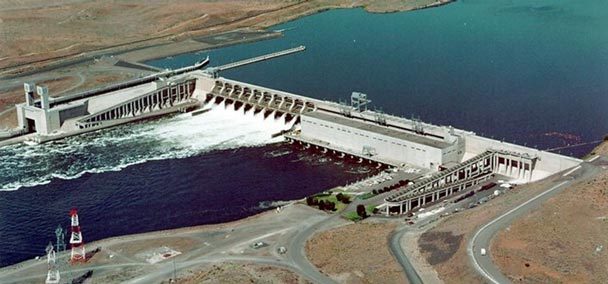forum
library
tutorial
contact

Federal Court Decision is a Critical Opportunity
for Salmon, Energy and Communities
by Bob Rees, Nancy Hirsh and Bill Arthur
Seattle Times, May 14, 2016
|
the film forum library tutorial contact |

|
Federal Court Decision is a Critical Opportunity
by Bob Rees, Nancy Hirsh and Bill Arthur
|
The government's costly strategy for the Columbia and Snake rivers' endangered salmon has failed.
A substantially different approach is required.
 EARLIER this month, the U.S. District Court in Portland rejected the government's latest plans for protecting endangered wild salmon from the harmful effects of the Columbia and Snake river dams. This is the fifth plan in a row to meet such a fate.
EARLIER this month, the U.S. District Court in Portland rejected the government's latest plans for protecting endangered wild salmon from the harmful effects of the Columbia and Snake river dams. This is the fifth plan in a row to meet such a fate.
Judge Michael Simon's sternly worded 150-page decision is a sharp rebuke to the National Oceanic and Atmospheric Administration and other federal agencies that have refused to acknowledge the need for a major change in dam management. It also reflects the opinions of three federal judges over two decades, each of whom has concluded the agencies that manage the federal hydrosystem have broken the law time and again by bending over backward to minimize changes to the dam operations, which are driving one of the Northwest's most ecologically and economically important species to extinction.
This latest decision is a critical opportunity to finally "get it right" by letting go of a past our region has outgrown and making a new plan for dam management that gives new clean energy and wild salmon the priority they deserve in today's world and -- more important -- in tomorrow's.
In ruling for the plaintiffs -- fishing, conservation and clean-energy advocates, the Nez Perce Tribe and state of Oregon -- the court toppled the fundamental building blocks of the federal agencies' failed salmon strategy and rejected their longstanding effort to lower the legal bar for protecting wild salmon. It also found NOAA and other federal agencies had failed to address the "potentially catastrophic impact" of climate change on these fish. Last year, an estimated 400,000 salmon died in the Columbia and Snake rivers' overheated reservoirs -- countless juvenile salmon en route to the ocean perished as well.
In addition, the court pointedly rejected NOAA's heavy reliance on uncertain, speculative habitat projects as a substitute for changes in dam operations. Restoring salmon habitat is crucial, but it is not a substitute for addressing directly the effects of the dams. And as the court noted, despite spending billions of dollars since the 1990s, we have not recovered a single stock of wild salmon or steelhead. Indeed, during this time, the number of populations at risk of extinction in the Columbia River Basin has grown from four to 13. While highlighting all of these flaws, the court also pointed the way forward when it condemned the agencies' failure to consider alternatives to the current failed approach and ordered them to produce a new salmon plan no later than March 1, 2018. This ruling is an opportunity for a new, comprehensive, transparent analysis that fully and fairly considers all credible alternatives to protect wild salmon and includes meaningful public participation. To resolve this extraordinarily expensive failure, Judge Simon made clear that the agencies must carefully consider Lower Snake River dam removal and other possible recovery strategies to protect salmon, such as expanded spill, increased flows and seasonal reservoir drawdowns. We agree. In fact, many of the region's leading salmon scientists have long argued that the removal of the four Lower Snake River dams must be at the heart of any effective salmon restoration program in the Columbia Basin. Much has changed in the past two decades. The Northwest today is a leader in the expansion of new renewable energy and energy efficiency. Renewable energy costs have dropped dramatically -- a recent NW Energy Coalition study on replacing the four dams' energy largely with solar calculates virtually unnoticeable additional costs to public utility bill payers -- around $1 per month. Other studies have found even lower costs.
Transportation and markets have changed as well. The Snake River navigation corridor no longer is a critical link between the Inland Empire and the sea. Rising costs to maintain this aging infrastructure amid shrinking federal resources have made continued spending on the Lower Snake River dams a highly uncertain economic investment. And as the region learned last summer, we're not even remotely ready for the future scale of climate change and the harm it will bring to wild salmon.
We believe the legal, scientific and economic case for removing these four dams today is stronger than ever.
With this ruling, the court has sent an unmistakable message: The government's costly strategy for the Columbia and Snake rivers' endangered salmon has failed. A substantially different approach is required. In the coming months, we look forward to participating with others in an honest, transparent analysis that accounts for what we now know and looks comprehensively at all of the alternatives for protecting wild salmon.
We urge the Obama administration to ensure that this work can begin immediately and we urge all of our elected officials to do all they can to support and protect the integrity of this process from Day 1. Only such an effort would allow us to seize the opportunity the court's decision offers.
Related Sites:
Read the judge's full ruling.
learn more on topics covered in the film
see the video
read the script
learn the songs
discussion forum
